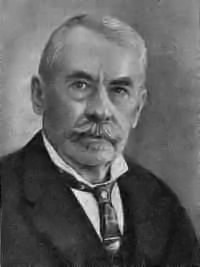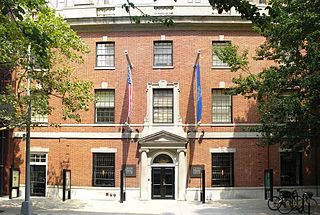Institute for the Study of the Jewish Question (German: Institut zum Studium der Judenfrage) was a German institute under Goebbels founded in 1934.
Institute for the Study of the Jewish Question may also refer to:
Eugen Karl Dühring was an antisemitic, positivist and socialist German philosopher and economist who was a strong critic of Marxism.

German Christians were a pressure group and a movement within the German Evangelical Church that existed between 1932 and 1945, aligned towards the antisemitic, racist, and Führerprinzip ideological principles of Nazism with the goal to align German Protestantism as a whole towards those principles. Their advocacy of these principles led to a schism within 23 of the initially 28 regional church bodies (Landeskirchen) in Germany and the attendant foundation of the opposing Confessing Church in 1934. Siegfried Leffler was a co-founder of the German Christians.

Theodor Fritsch was a German publisher and journalist. His antisemitic writings did much to influence popular German opinion against Jews in the late 19th and early 20th centuries. His writings also appeared under the pen names Thomas Frey, Fritz Thor, and Ferdinand Roderich-Stoltheim.

YIVO is an organization that preserves, studies, and teaches the cultural history of Jewish life throughout Eastern Europe, Germany, and Russia as well as orthography, lexicography, and other studies related to Yiddish. Established in 1925 in Wilno in the Second Polish Republic as the Yiddish Scientific Institute.
"On the Jewish Question" is a response by Karl Marx to then-current debates over the Jewish question. Marx wrote the piece in 1843, and it was first published in Paris in 1844 under the German title "Zur Judenfrage" in the Deutsch–Französische Jahrbücher.
The Jewish question was a wide-ranging debate in 19th- and 20th-century Europe that pertained to the appropriate status and treatment of Jews. The debate, which was similar to other "national questions", dealt with the civil, legal, national, and political status of Jews as a minority within society, particularly in Europe during the 18th, 19th, and 20th centuries.

Gerhard Kittel was a German Lutheran theologian and lexicographer of biblical languages. He was an enthusiastic supporter of the Nazis and an open antisemite. He is known in the field of biblical studies for his Theologisches Wörterbuch zum Neuen Testament.
Walter Frank, also known by the pseudonym Werner Fiedler was a National Socialist historian, notable for his leading role in research of the Jewish question.
IEJ may refer to:
Antisemitism, the prejudice or discrimination against Jews, has had a long history since the ancient times. While antisemitism had already been prevalent in ancient Greece and Roman Empire, its institutionalization in European Christianity after the destruction of the ancient Jewish cultural center in Jerusalem caused two millennia of segregation, expulsions, persecutions, pogroms, genocides of Jews, which culminated in the 20th-century Holocaust in Nazi German-occupied European states, where 67% European Jews were murdered.

Ulrich Fleischhauer was a leading publisher of antisemitic books and news articles reporting on a perceived Judeo-Masonic conspiracy theory and "nefarious plots" by clandestine Jewish interests to dominate the world.
The Institute for Research on the Jewish Question was a Nazi Party political institution, founded in April 1939. Conceived as a branch of a projected elite university of the party under the direction of Alfred Rosenberg, it officially opened in Frankfurt am Main in March 1941, during the Second World War, and remained in existence until the end of the war, in 1945.

The Reichsleiter Rosenberg Taskforce was a Nazi Party organization dedicated to appropriating cultural property during the Second World War. It was led by the chief ideologue of the Nazi Party, Alfred Rosenberg, from within the NSDAP Office of Foreign Affairs. Between 1940 and 1945, the ERR operated in France, Netherlands, Belgium, Poland, Lithuania, Latvia, Estonia, Greece, Italy, and on the territory of the Soviet Union in the Reichskommissariat Ostland and Reichskommissariat Ukraine. Much of the looted material was recovered by the Allies after the war, and returned to rightful owners, but there remains a substantial part that has been lost or remains with the Allied powers.
Since World War II, antisemitic prejudice in Italy has seldom taken on aggressive forms.

Karl Alexander von Müller was a German historian. His immediate disciples were Nazi politicians and academics such as Baldur von Schirach, Rudolf Heß, Hermann Göring, Walter Frank, Wilhelm Grau, Wilfried Euler, Clemens August Hoberg, Hermann Kellenbenz, Karl Richard Ganzer, Ernst Hanfstaengl and Klaus Schickert. However, due to his political openness, other non-Nazi historians such as Karl Bosl, Alois Hundhammer, Heinz Gollwitzer and even Wolfgang Hallgarten also studied under Müller. He had also taught the medievalist Edward Rand.
Heinz Röthke was a German SS-Obersturmführer of Nazi Germany and a convicted war criminal. Röthke was the Gestapo Jewish expert in Paris, and, as such, was in overall charge of the concentration camp in Occupied France as well as of the deportation of Jews, between 1940 and 1944, during the Holocaust.
Carltheo Zeitschel also Carl Theo,, was a German physician, diplomat, Nazi functionary and SS-Sturmbannfuhrer (major).
The Institut d'étude des questions juives (IEQJ) was an anti-Semitic propaganda organization created in France under the German occupation during World War II, with the support of the Propagandastaffel and under the regulation of the Gestapo.
The "Jewish parasite" is a notion that dates back to the Age of Enlightenment. It is based on the notion that the Jews of the diaspora are incapable of forming their own states and would therefore attack and exploit states and peoples. The stereotype is often associated with the accusation of usury and the separation of productive capital and financial capital.
The Institute for the Study of the Jewish Question was founded in 1934 and was affiliated with the Reich Ministry of Propaganda under Joseph Goebbels. In 1939 the institution was called "Anti-Semitic Action" and from 1942 "Anti-Jewish Action".